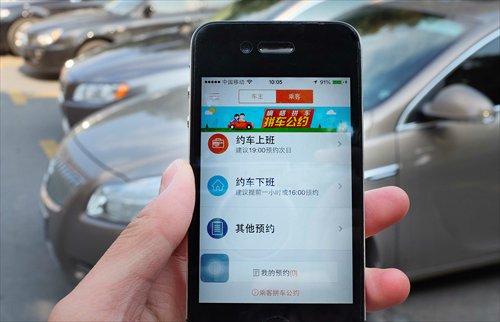Tiantian Yongche gets third round of investment
New financing led by Baidu; car-pooling app valued at almost $200m

A car-pooling app displayed on a smartphone Photo: CFP
Car-pooling mobile application Tiantian Yongche said on Monday that it had received a third round of investment led by China's search engine giant Baidu Inc, leading to a company valuation close to $200 million.
Beijing Tian He Yi Technology Co, the developer and operator of Tiantian Yongche, did not reveal how much the latest financing is in the Monday statement released on its Weibo account but said it is the largest single investment ever received by a car-pooling company in the country and that Tiantian Yongche was the highest-valued firm in the country's car-pooling sector.
A car-pooling app that has only been in operation for about eight months, Tiantian Yongche has already finished three rounds of financing in the past six months, Zhai Guanglong, CEO of Tian He Yi, said on his Weibo account Monday.
Unlike other car-pooling or car-hailing apps, Tiantian Yongche focuses on car sharing in commutes between home and work locations and car owners can provide at most two rides per day. The app only covers first-tier cities so far.
Setting a daily limit on car sharing will rule out those who just want to make profits through car pooling, domestic tech news portal 36kr.com reported Monday, citing Zhai.
Zhai compared Tiantian Yongche with US-based home sharing platform Airbnb and said that in addition to receiving payment, "having fun" is important for forming a sharing model, according to the report.
Therefore, Tiantian Yongche attaches great importance to the social networking function of its app by encouraging drivers to take different car riders and users to share photo and posts.
Car-pooling based on commuting paths linking home and workplaces helps build and maintain stable user bases, Zhang Xu, an analyst with Beijing-based market consultancy Analysys International, told the Global Times Monday.
Tiantian Yongche is faced with fierce competition as there are at least several dozen car-pooling apps competing in the market, domestic news portal sohu.com reported Friday. Didi Dache, one of China's most popular car-hailing apps and backed by local Internet giant Tencent Holdings, reportedly plans to start a car-pooling service of its own.
Other than Tiantian Yongche, Baidu has also invested in another car-pooling app 51 Yongche, according to media reports.
"Both Tencent and Alibaba [the e-commerce giant in support of car-hailing app Kuaidi Dache] have invested in car-hailing apps and Baidu is catching up," said Zhang.
Car-hailing platform can be connected with other Baidu services, including Baidu's payment tool, online navigation, and group-buying services, according to Zhang.
But analysts are also concerned about the prospects of domestic car-pooling service, which also likely falls under the category of illegal "black cars" as car-hailing service does.
The Beijing Municipal Commission of Transport released a guideline on its official website last year, encouraging car-pooling to ease traffic pressure during the peak hours and reduce air pollution, but prohibiting illegal business operation.
It is hard to define whether car owners are sharing their cars for the good of the public or for making profits, Zhao Zhanling, a legal counsel with the Internet Society of China, told the Global Times Monday.
For the sound development of car pooling, the transport administration department should set standards, such as a price range, Zhao said, noting black cars usually charge more than taxis and car-pooling services.
The Beijing Transport Law Enforcement Corps under Beijing Municipal Commission of Transport said in January it would further strengthen the crackdown on illegal "black cars" which operate as taxis through car-hailing apps, according to media reports.
Car pooling increases the efficiency of vehicle utilization, which large cities have an urgent need for, Zhang said, expecting that concerns over black cars or safety can be solved by improving management and regulation.